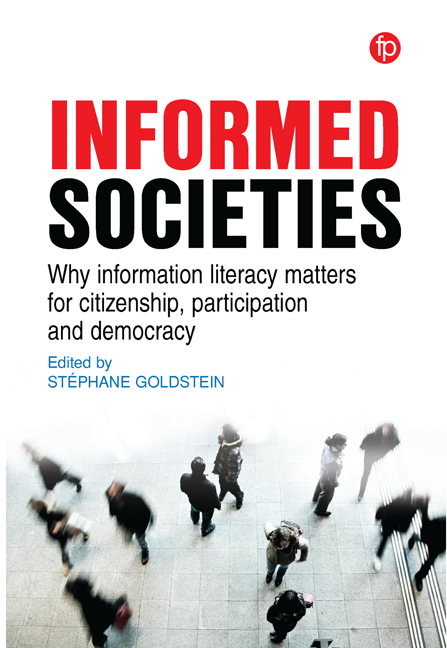Book contents
- Frontmatter
- Contents
- Figures and Tables
- Notes on the authors
- Foreword
- Introduction
- 1 Information Literacy in the Digital Age: Why Critical Digital Literacy Matters for Democracy
- 2 The Discourses of Power, Information and Literacy
- 3 What Intellectual Empathy Can Offer Information Literacy Education
- 4 The ‘Post-Truth’ World, Misinformation, and Information Literacy: a Perspective From Cognitive Science
- 5 Media and Information Literacy: Intersection and Evolution, a Brief History
- 6 Information Literacy and National Policy Making
- 7 Information Literacy as a Growth Pillar for a Fledgling Democracy
- 8 Information literacy and the Societal Imperative of Information Discernment
- 9 Libraries and Democracy: Complementarity in a Regime of Truth
- 10 Scottish Public Libraries Welcome Syrian New Scots: a Transition from Being a Refugee to Becoming an Active Part of the Community
- 11 Information Literacy, Lifelong Learning and the Needs of an Ageing Population
- Index
9 - Libraries and Democracy: Complementarity in a Regime of Truth
Published online by Cambridge University Press: 22 February 2020
- Frontmatter
- Contents
- Figures and Tables
- Notes on the authors
- Foreword
- Introduction
- 1 Information Literacy in the Digital Age: Why Critical Digital Literacy Matters for Democracy
- 2 The Discourses of Power, Information and Literacy
- 3 What Intellectual Empathy Can Offer Information Literacy Education
- 4 The ‘Post-Truth’ World, Misinformation, and Information Literacy: a Perspective From Cognitive Science
- 5 Media and Information Literacy: Intersection and Evolution, a Brief History
- 6 Information Literacy and National Policy Making
- 7 Information Literacy as a Growth Pillar for a Fledgling Democracy
- 8 Information literacy and the Societal Imperative of Information Discernment
- 9 Libraries and Democracy: Complementarity in a Regime of Truth
- 10 Scottish Public Libraries Welcome Syrian New Scots: a Transition from Being a Refugee to Becoming an Active Part of the Community
- 11 Information Literacy, Lifelong Learning and the Needs of an Ageing Population
- Index
Summary
Introduction
Traditionally, libraries and librarians have played an important part in the provision of information to support democracy and the democratic processes. In this context, this chapter reports on a study conducted in 2017 which explores and compares the respective contributions of public libraries and university libraries in Sydney, Australia, to supporting democratic processes. It concludes that in spite of a shift from an institutionally based view of truth to one focusing on an individual, librarians are still concerned with principles that underpin the understanding of quality in information.
Democracy and library services
Western culture has developed based on notions that truth, by overcoming falsehood, underpins democracy. However, Rose and Barros (2017) claim we are no longer concerned with creating a consensus of knowledge, and Harsin (2015) asserts that we are undergoing a shift from a regime of truth to a regime of post-truth, where citizens acknowledge that they cannot easily verify a truth claim. Foucault – whose influence on thinking on the relationship between information, knowledge and authority is described by Andrew Whitworth in Chapter 2 of this book – wrote that ‘each society has its regime of truth, its general politics of truth: that is the type of discourse which it accepts and makes function as true, the mechanisms and instances which enables one to distinguish true and false statements’ (Foucault, 1980, 131). Foucault's regimes of truth are produced by institutions in which there are relatively clear processes for identifying the authority of the source of a message and therefore the credibility of that message, control over channels of communication is understood, the processes for validation of the content of messages are recognised, mechanisms for addressing audiences are regulated and competing messages can be categorised so that the flow of information is not overwhelming.
For Harsin (2015), key factors in a regime of post-truth include fragmentation of sources of information leading to a dilution of authority, the creation of social groups bounded by the use of technology, content targeted to these bounded groups, along with shifts in journalistic practices, political communication and the speed of communication. Lewandowsky, Cook and Ecker (2017, 420) identified seven societal trends indicating ‘the emergence of a post-truth world’, although they acknowledge that this list may not be exhaustive.
- Type
- Chapter
- Information
- Informed SocietiesWhy information literacy matters for citizenship, participation and democracy, pp. 165 - 180Publisher: FacetPrint publication year: 2019
- 2
- Cited by



